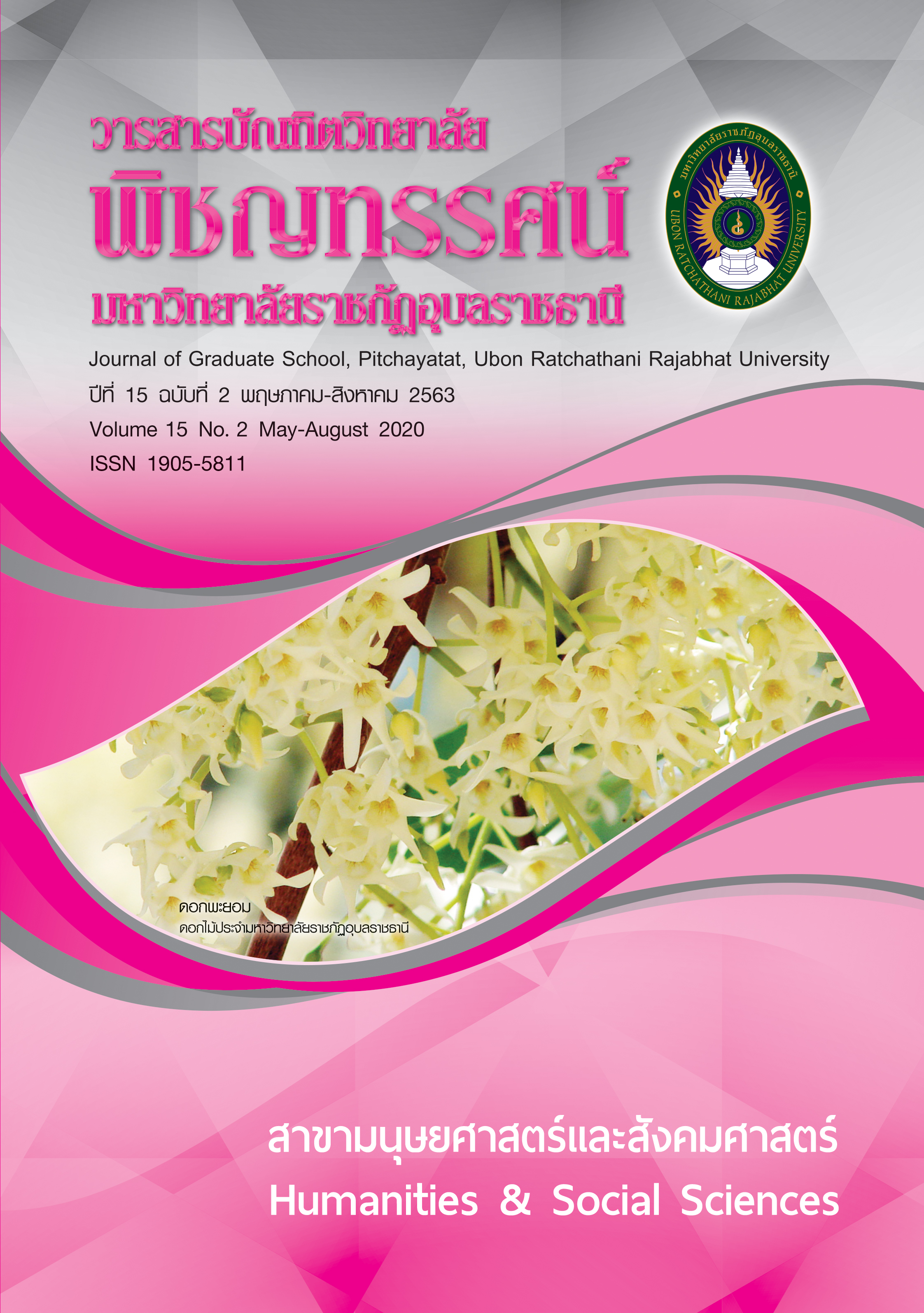รูปแบบการพัฒนาความผาสุกในการปฏิบัติงานของครูโรงเรียนเอกชนที่มีประสิทธิผล
คำสำคัญ:
ความผาสุก, การปฏิบัติงาน, ครูโรงเรียนเอกชนบทคัดย่อ
บทคัดย่อ
การวิจัยนี้มีวัตถุประสงค์หลักเพื่อสร้างรูปแบบการพัฒนาความผาสุกในการปฏิบัติงานของครูโรงเรียนเอกชนที่มีประสิทธิผล การวิจัยแบ่งออกเป็น 4 ตอน ดังนี้ 1) ศึกษาวิเคราะห์และกำหนดกรอบความผาสุกในการปฏิบัติงาน 2) ศึกษาความผาสุกในการปฏิบัติงานของครู 3) ร่างรูปแบบการพัฒนาความผาสุกในการปฏิบัติงานของครูโรงเรียนเอกชนที่มีประสิทธิผล และ 4) ประเมินรูปแบบการพัฒนาความผาสุกในการปฏิบัติงานของครูโรงเรียนเอกชนที่มีประสิทธิผล ตัวอย่างได้แก่ ครูผู้สอนในโรงเรียนเอกชนภาคใต้ฝั่งอันดามัน จำนวน 220 คน จาก 55 โรงเรียน ที่ได้มาจากการเลือกแบบเจาะจง เครื่องมือประกอบด้วยแบบสอบถาม แบบสัมภาษณ์ แบบตรวจสอบความสอดคล้อง ประเมินรูปแบบโดยจัดการสัมมนาอิงผู้ทรงคุณวุฒิ ผู้เชี่ยวชาญ เพื่อพิจารณาในด้านความเหมาะสม ความเป็นไปได้ ด้านความสอดคล้อง และความเป็นประโยชน์ สถิติที่ใช้ ได้แก่ ร้อยละ ค่าเฉลี่ย ส่วนเบี่ยงเบนมาตรฐาน และค่าสัมประสิทธิ์แอลฟาตามวิธีของครอนบาค
ผลการวิจัยพบว่า
- แนวคิดของความผาสุกในการปฏิบัติงานของครูโรงเรียนเอกชนที่มีประสิทธิผล ที่ได้จากการวิจัยครั้งนี้ พบว่ามีทั้งหมด 9 ปัจจัย ดังนี้ 1) โครงสร้างและการบริหารจัดการ 2) ลักษณะของผู้นำและการจัดการ 3) นโยบายและการสื่อสาร 4) สภาพแวดล้อมในการทำงาน 5) วัฒนธรรมโรงเรียน 6) การพัฒนาคุณภาพบุคลากร 7) สวัสดิการและความสมดุลของการทำงาน 8) ความผูกพันต่อโรงเรียน และ 9) การมีส่วนร่วมระหว่างองค์กร
- รูปแบบการพัฒนาความผาสุกในการปฏิบัติงานของครูโรงเรียนเอกชนที่มีประสิทธิผล เรียงตามลำดับที่มีความคิดเห็นสูงสุดได้ ดังนี้ 1) โครงสร้างและการบริหารจัดการ 2) ลักษณะของผู้นำและการจัดการ 3) นโยบายและการสื่อสาร 4) สภาพแวดล้อมในการทำงาน 5) วัฒนธรรมโรงเรียน 6) การพัฒนาคุณภาพบุคลากร 7) สวัสดิการและความสมดุลของการทำงาน 8) ความผูกพันต่อโรงเรียน และ 9) การมีส่วนร่วมระหว่างองค์กร ผู้วิจัยได้ออกแบบรูปแบบที่เรียกว่า LAB 2 PEC
- ผลการประเมินรูปแบบตามความคิดเห็นของผู้ทรงคุณวุฒิ ผู้เชี่ยวชาญ สรุปได้ว่ามีความเหมาะสม ความเป็นไปได้ ความสอดคล้องและเป็นประโยชน์
คำสำคัญ: ความผาสุก การปฏิบัติงาน ครูโรงเรียนเอกชน
เอกสารอ้างอิง
คณะกรรมการส่งเสริมการศึกษาเอกชน, สำนักงาน. แผนพัฒนาการศึกษาเอกชน พ.ศ. 2560 - 2564 กลุ่มนโยบายและแผน. กรุงเทพฯ: สกสค.
ลาดพร้าว, 2559.
จิรภา อินจันทร์สุข. รูปแบบการพัฒนาความผูกพันต่อองค์กรของครูในสถานศึกษาสังกัดสำนักงานเขตพื้นที่การศึกษามัธยมศึกษา เขต7. ศึกษาศาสตรดุษฎีบัณฑิต มหาวิทยาลัยปทุมธานี, 2560.
ชนิดา เล็บครุฑ. รายงานวิจัยเรื่องผลกระทบของคุณภาพชีวิตในการทำงานที่มีต่อความผูกพันต่อองค์การของบุคลากรสายสนับสนุน สถาบันบัณฑิตพัฒนบริหารศาสตร์. กรุงเทพฯ: สถาบันบัณฑิตพัฒนบริหารศาสตร์, 2554.
ดาวรุวรรณ ถวิลการ. วัฒนธรรมองค์การในโรงเรียนรางวัลพระราชทาน : การวิจัยเชิงชาติพันธุ์วรรณนา.ขอนแก่น: มหาวิทยาลัยขอนแก่น, 2552.
ทักดนัย เพชรเภรี. “การพัฒนารูปแบบการธำรงรักษาบุคลากรโรงเรียนเอกชน ประเภทสามัญศึกษา,” วารสารศึกษาศาสตร์ มหาวิทยาลัยนเรศวร. 15, 5 (ฉบับพิเศษ ตุลาคม 2556): 8-19.
ธร สุนทรายุทธ. ปรัชญาการบริหารจัดการ. กรุงเทพฯ: เนติกุลการพิมพ์, 2554.
พิชิต ฤทธิ์จรูญ. หลักการวัดและประเมินผลการศึกษา. พิมพ์ครั้งที่ 4. กรุงเทพฯ: เฮ้าท์ ออฟ เคอร์มีสท์, 2554.
พิธาน พื้นทอง. ยุทธศาสตร์การพัฒนาคุณภาพการบริหารจัดการศึกษาในโรงเรียนขนาดเล็ก สังกัดสำนักงานเขตพื้นที่การศึกษาอุบลราชธานี เขต 1. วิทยานิพนธ์ศึกษาศาสตรดุษฎีบัณฑิต มหาวิทยาลัยขอนแก่น,2560.
มนต์สิงห์ ไกรสมสุข. แรงจูงใจในการทำงานที่ส่งผลต่อความผูกพันต่อองค์การของครูในโรงเรียนคาทอลิก สังกัดอัครสังฆธฆณฑล กรุงเทพมหานคร. วิทยานิพนธ์ศึกษาศาสตรมหาบัณฑิต มหาวิทยาลัยศิลปากร, 2552.
รวมศิริ เมนะโพธิ. เครื่องมือวัดการทำงานอย่างมีความสุข กรณีศึกษานักศึกษาภาคพิเศษระดับปริญญาโท สถาบันบัณฑิตพัฒนบริหารศาสตร์. สารนิพนธ์วิทยาศาสตรมหาบัณฑิต สถาบันบัณฑิตพัฒนบริหารศาสตร์, 2550.
ศุภริณี อำภรณ์. ปัจจัยเชิงสาเหตุด้านการบริหารที่ส่งผลต่อการลาออกจากงานของครูโรงเรียนเอกชน พ.ศ.2553. (online) 2553 (อ้างเมื่อวันที่ 16 มีนาคม 2561). Available from: จากhttp://www.dpu.ac.th
ศูนย์ประสานงานเครือข่ายผู้ปกครองในสถานศึกษา. ศูนย์ประสานงานเครือข่ายผู้ปกครองในสถานศึกษาประสานพลังโรงเรียนลูก =โรงเรียนเรา พ.ศ.2551. (online) 2551 (อ้างเมื่อวันที่ 16 มีนาคม 2561). Available from: จาก http://oknation.nationtv.tv/blog/school123/2008/03/18
สมาน อัศวภูมิ. การบริหารสถานศึกษาตามแนวการปฏิรูปการศึกษายุคใหม่. (ฉบับปรับปรุง). อุบลราชธานี: อุบลกิจ ออฟเซท, 2557.
เสริมศักดิ์ วิศาลาภรณ์. เกียรติคุณ ทางการบริหารการศึกษา ศาตราจารย์ ดร.เสริมศักดิ์ วิศาลาภรณ์. กรุงเทพฯ:อี ที พับลิชซิ่ง, 2552.
ส่งเสริมการเกษตร, กรม. “การศึกษาความผาสุก ความพึงพอใจและแรงจูงใจในการทำงานของบุคลากร กรมส่งเสริมการเกษตร,” กรุงเทพฯ: กรมส่งเสริมการเกษตร, 2555.
Coleman R, H., Glover, J. A., Educational Psychology: Principles and Application. Boston: Little, Brown, 2010.
Hoy, W.K. and Miskel, C.G. Educational administration : Theory, Research, and Practice. 9th ed. New York: McGraw-Hill, 2013.
Lunenburg, Fred and C.Ornstein Allan. Educational Administration : Concept and Practice.2nded. New York : Wadsworth Publishing Company, 2012.
Pedler, M. Action Learning In Practice. 4thed. Brookfield, Vt.: Gower, 2010.
Tayo O. George, et al. “Effective Service Delivery of Nigeria’s Public Primary Education: The Role of Non-State Actors,” Journal of African Development. 15, 1 (2013): 221-245.
Welch, J. and Kordysh, D. “Seven Keys to ERP Success,” Strategic Finance. 89, 3 (2001): 40-61.
ดาวน์โหลด
เผยแพร่แล้ว
รูปแบบการอ้างอิง
ฉบับ
ประเภทบทความ
สัญญาอนุญาต
บทความทุกเรื่องได้รับการตรวจความถูกต้องทางวิชาการโดยผู้ทรงคุณวุฒิภายนอกอย่างน้อย 3 คน ความคิดเห็นในวารสารพิชญทรรศน์เป็นความคิดเห็นของผู้นิพนธ์มิใช่ความคิดเห็นของผู้จัดทำ จึงมิใช่ความรับผิดชอบของวารสารพิชญทรรศน์ และบทความในวารสารพิชญทรรศน์สงวนสิทธิ์ตามกฎหมายไทย การจะนำไปเผยแพร่ต้องได้รับอนุญาตเป็นลายลักษณ์อักษรจากกองบรรณาธิการ





